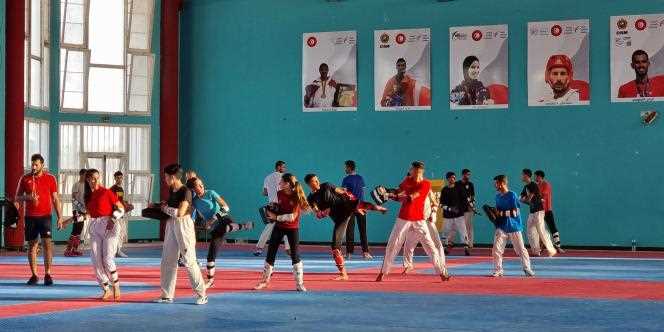To stay up to date with African news, subscribe to the “World Africa” newsletter from this link. Every Saturday at 6 am, find a week of current events and debates treated by the editorial staff of “Monde Afrique”.
In the heat of the early evening, a few families from the Ennahli district, north of Tunis, drink a coffee under the trees. The tranquility of the place is barely disturbed by the dry cries of sportsmen in full effort escaping from a neighboring room lit by neon lights. Young people but also adults are in full swing sparring, combat training, a taekwondo course. Mabrouka Gharbi, 36, wipes the beads of sweat off her forehead after a series of kicks. She became adept at the Korean martial art as she watched her two children take a class. “After a while, I thought to myself why not give them a try? It was difficult at the start because I don’t have the same flexibility, but I get better with time ”, she breathes.
She is not the only passionate in her country. “Since 2013, the moment when Tunisians started winning medals at the world level, the craze for taekwondo has grown. It has become almost as popular as football in Tunisia ”, explains Aymen Taabi, the coach.
For several years now, fans of this discipline have been growing in number. The Tunisian Taekwondo Federation (FTT) says it has 30,000 licensees and nearly 60,000 practitioners in more than 500 clubs spread across the territory, not to mention the courses given in sports halls. The victory of young Mohamed Khalil Jendoubi, who won silver at the Olympic Games in Tokyo this year at the age of 19 in the under 58 kg category, and that of Osama Oueslati (under 80 kg), bronze medalist at Rio in 2016, have bolstered the popularity of the martial art.
“A real social vocation”
“Sport has existed in Tunisia for more than twenty years, but in recent years we have implemented a strategy to really democratize it”, explains Mohamed Ghannem, lawyer, taekwondoist since his childhood and president of the FTT which puts forward a sport ” accessible to everyone ” with many educational virtues. “The rigor and mental preparation that this discipline requires helps provide a framework for children and adolescents. For the best, it also offers prospects for the future. Many go to sports high school and can then go on to a higher institute of sport and academic education “, he adds. After two years of post-baccalaureate studies, a taekwondoist can teach. A boon for many young people in a country where the unemployment rate among this category is approaching 36%.
And no one is mistaken: taekwondo is particularly successful in the working-class districts of the capital, but also in the most remote regions of Tunisia. “We don’t have a lot of money, but I think there is a real social vocation for this martial art. Its development can really help the most disadvantaged classes ”, says Mohamed Ghannem. The federation, which has a budget of around 600,000 dinars (183,000 euros) per year to develop the territorial network of taekwondo, has created regional championships for young people who would not have the means to go to Tunis or would not dare to try their luck in the capital.
Seifeddine Trabelsi, 29, coach of the national team, believes that the state should take the discipline more seriously, give it more resources. “Because even if, at the beginning, it is a sport which requires little expenditure for the family, once one reaches a high level, it is necessary to finance the trips for the competitions”, underlines the coach, himself in search of sponsors for the next championships.
“No differences between the sexes”
The beneficial effects of taekwondo on the youth are visible. At the Menzah 1 sports hall in Tunis, Wahid Briki watches the national team train. He started taekwondo twenty years ago and after being crowned champion several times, became the coach of the junior team. The athlete belongs to this new generation of enthusiasts from working-class neighborhoods who have found a vocation and a job thanks to this martial art. “I am from Hay Etthadamen, in Tunis [un quartier populaire en périphérie] and this sport creates real competition among young people. It combines combat and discipline, and it is less violent than boxing. It helps young people to channel their energy ”, he points out, adding that most of the champions are from working-class neighborhoods.
“Mohamed Khalil Jendoubi comes from Djedeida, west of Tunis. He started in a very small club and he was able to become Olympic champion at 19, without much means but with a lot of effort and work. It makes young people dream. They also see the respect that Khalil and other champions inspire within their neighborhood. It is a form of social recognition ”, insists Wahid Briki. On his return from Tokyo, the young man was greeted in his neighborhood with smoke and brass bands and his photo is now displayed on the wall of Menzah 1, next to those of the other champions.
Martial art also appeals to many women. According to Mohamed Ghannem, they are even on the way to overtaking men in terms of the number of amateurs and licensees. In the Menzah hall, the girls of the national team sparring among themselves but training with the men. Chaima Toumi, 17, says that she naturally went to the sport, encouraged by her father, a former Taekwondo coach. “I like the fact that there is no difference between the sexes. At the championships, we are mixed, in training too. This breaks the cliché that combat sports are only for men ”, she says. All the athletes of the national team now have their eyes on the Olympic Games in Paris in 2024.
